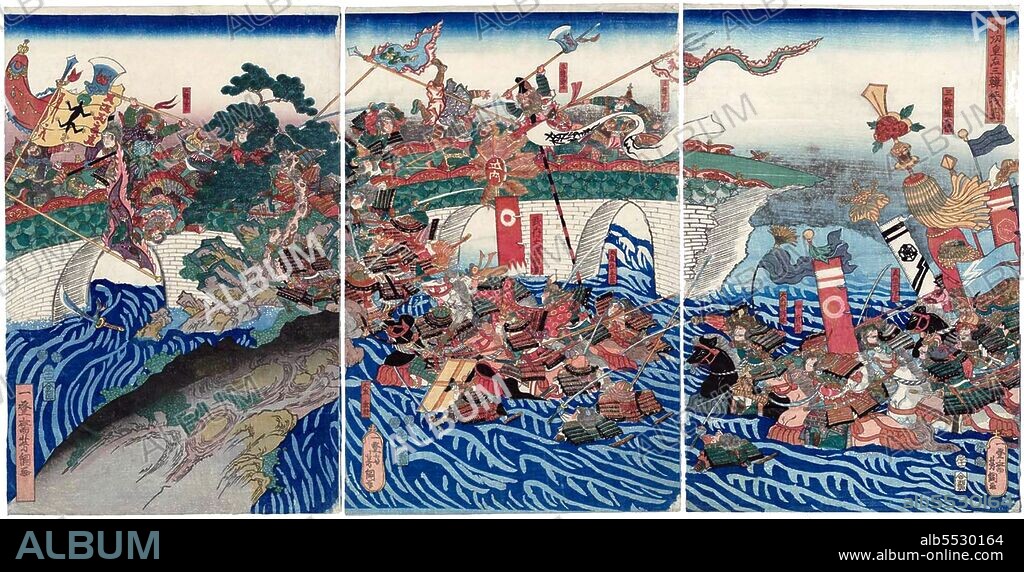alb5530164
Japan: 'Empress Jingû Attacks the Three Korean Kingdoms' (Jingû Kôgô Sankan seibatsu no zu). Utagawa Yoshitsuna (fl. c. 1848-1868),1852

|
Add to another lightbox |
|
Add to another lightbox |



Buy this image.
Select the use:

Title:
Japan: 'Empress Jingû Attacks the Three Korean Kingdoms' (Jingû Kôgô Sankan seibatsu no zu). Utagawa Yoshitsuna (fl. c. 1848-1868),1852
Caption:
Empress Jingu was consort to Emperor Chuai (notionally 192 – 200 CE), she also served as Regent from the time of her husband's death in 209 until her son Emperor Ojin acceded to the throne in 269. No firm dates can be assigned to this historical figure's life or reign. Jingu is regarded by historians as a 'legendary' figure because of the paucity of information about her. Legend has it that she led an army in an invasion of Korea and returned to Japan victorious after three years. However, this theory is widely rejected even in Japan as there is no evidence of Japanese rule in any part of Korea at this early period. Some believe that Empress Jingu's conquest is only based on the Gwanggaeto Stele (in Jilin, China). But the legend of Jingu's invasion of the Korean peninsula also appears in the ancient Japanese chronicles Kojiki written in 680 and Nihon Shoki written in 720.
Credit:
Album / Pictures From History/Universal Images Group
Releases:
Image size:
5100 x 2583 px | 37.7 MB
Print size:
43.2 x 21.9 cm | 17.0 x 8.6 in (300 dpi)
Keywords:
AMAZON • ARMS: SAMURAI SWORD • ART • ARTS • ASIA PICTURES • ASIA • ASIAN IMAGE • ASIAN IMAGES • ASIAN PICTURES • ASIAN • EMPRESS JINGU • EMPRESS • FEMALE WARRIORS • FEMALES • HISTORIA UNIVERSAL • HISTORIA • HISTORICAL IMAGES • HISTORICAL PICTURES • HISTORICAL • HISTORY IMAGES • HISTORY PICTURES • HISTORY • HISTORY. • JAPAN • JAPAN: SAMURAI • JAPANESE EMPERORS • JAPANESE • LEGEND • MONARCH • MONARCHY • MUJER • MUJERES • ONNA-BUGEISHA • PAINT • PAINTING • PAINTINGS • QUEEN • QUEENS • ROYALTY • RULER (POLITICAL) • RULER • RULERS • SAMURAI SWORD • SAMURAI WARRIOR • SAMURAI • SOVEREIGN (RULER) • SOVEREIGN • UKIYO-E • WOMAN WARRIOR • WOMAN WOMEN • WOMAN'S • WOMAN • WOMAN. • WOMANS • WOMEN IN HISTORY • WOMEN'S • WOMEN • WOMENS • WOODBLOCK PRINT • WOODBLOCK • WOODCARVING • WOODCUT • XYLOGRAPHY


 Pinterest
Pinterest Twitter
Twitter Facebook
Facebook Copy link
Copy link Email
Email
